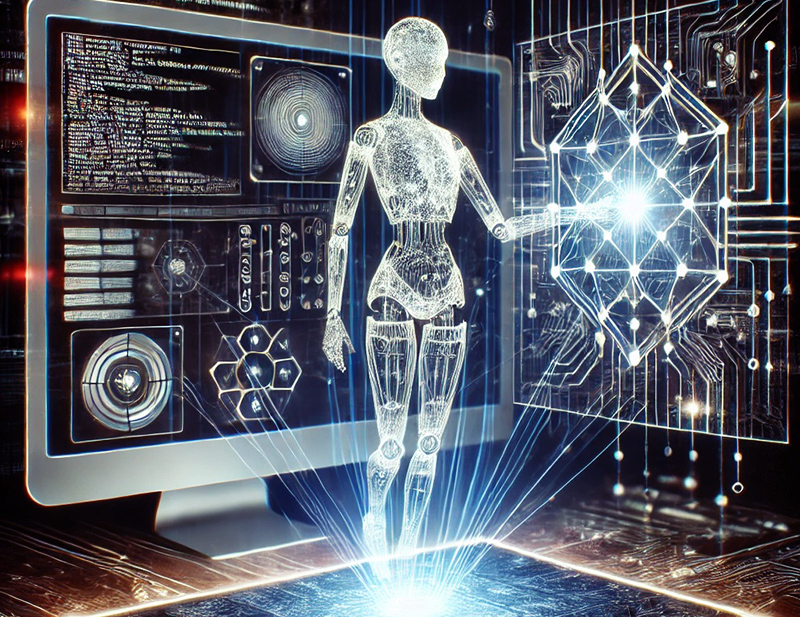
Key Takeaways
- AI Agents autonomously handle complex tasks, freeing up human resources for more strategic roles and elevating business productivity.
- With continuous learning and data analysis, AI Agents deliver highly personalized interactions, improving customer satisfaction and loyalty.
- AI Agents operate 24/7 and can scale to meet demand, offering consistent service quality and valuable insights into customer preferences.
- Despite their benefits, AI Agents require careful oversight due to risks like system errors and transparency challenges in decision-making.
A New Frontier in Business Automation
The rise of AI Agents marks a turning point in how businesses approach productivity and automation. Leading the charge is Anthropic, which recently introduced AI Agents capable of using computers much like a human would. These agents can autonomously complete complex, multistep tasks, representing a leap forward from earlier AI tools focused on generating text or images. Now, AI Agents are engineered to analyze data or respond to inquiries and to actively perform tasks that typically demand human involvement.
Amid this technological shift, our company, Netiks, is staying at the forefront by integrating tools such as Microsoft's Copilot and Azure Machine Learning to enhance client offerings. By embedding Copilot’s and Azure ML's advanced capabilities within its products, Netiks enables clients to leverage AI agents in their own operations, maximizing efficiency and freeing employees to focus on strategic work.
Anthropic’s entry into the market has sparked intense competition among tech giants like Microsoft, Google, and OpenAI, all eager to integrate advanced AI Agents into business operations. Unlike traditional AI, which operates within specific applications, these agents interact with computer systems more broadly, using screens, keyboards, and mouse inputs as a human would. This groundbreaking capability promises transformative benefits for businesses. However, concerns about reliability, oversight, and responsible deployment are becoming increasingly urgent.

Designed by Freepik
AI Agents Explained
An AI agent is an advanced artificial intelligence system designed to perform tasks without constant human intervention. Unlike traditional AI, which often requires specific programming or input for each task, AI Agents can handle complex and multi-step processes independently. Equipped with natural language processing (NLP) and machine learning capabilities, they can respond to user inquiries, make decisions, and even interact with digital environments, closely resembling human behavior.
AI Agents analyze environments, make data-driven decisions, and act to achieve goals autonomously. For instance, an AI agent can gather customer data, generate reports, or navigate software to complete tasks, much like a virtual assistant but with far greater independence and complexity. Once activated, they can continue their tasks with minimal oversight, returning to the user only when additional input or clarification is needed.
The potential of AI Agents extends far beyond routine tasks. By automating more intricate functions, these agents allow businesses to scale quickly, enhance productivity, and allocate human talent to more strategic roles.
AI Agents can produce high-quality content, reducing review cycle times by 20 to 60 percent *
* McKinsey
How Do AI Agents Work?
AI Agents operate through a structured process that combines data collection, decision-making, action execution, and continuous learning.
1- Data Gathering and Perception
The process starts with AI Agents collecting data from multiple sources, such as customer interactions or real-time transaction data, allowing them to recognize and understand patterns in queries. Advanced agents process this data instantaneously, enabling them to respond with highly relevant, updated information.
2- Analysis and Decision-Making
Once data is gathered, AI Agents apply machine learning models to interpret it, predicting the best course of action based on the context and past interactions. This decision-making ability is what allows AI to tailor responses or services to individual users. Over time, agents "learn" and adapt their responses based on feedback, which increases their efficiency in similar future tasks.
3- Action Implementation
After deciding on a response or action, AI Agents execute it—be it answering questions, processing a request, or escalating an issue to a human if needed. This process involves leveraging task automation tools to deliver quick and precise responses.
4- Learning and Iterative Improvement
A key strength of AI Agents lies in their continuous learning loop. They update their algorithms and knowledge base with each interaction, refining their approach to meet changing needs. This ongoing learning helps agents remain responsive to both user preferences and environmental shifts.
This streamlined process is fundamental to how AI agents work, enabling them to perform with increasing autonomy across various applications, from customer service to software development.

Designed by Freepik
Benefits of AI Agents
AI Agents bring multiple transformative benefits to businesses, enhancing productivity and customer experience. Here's a concise look at their most impactful advantages:
1- Task Automation
AI Agents excel at automating repetitive or complex tasks, enabling companies to reduce labor costs and complete operations at scale. By delegating workflows to AI, businesses free human employees to focus on higher-level strategic work.
2- Enhanced Responsiveness
Unlike traditional customer service systems, AI Agents can handle multiple interactions simultaneously, offering faster and more reliable responses to customer inquiries. This not only improves response times but also ensures that customers receive high-quality, consistent information.
3- Scalability and 24/7 Availability
AI Agents are designed to scale effortlessly as demand grows, making them a flexible solution for businesses experiencing high interaction volumes. Their constant availability supports customers worldwide regardless of the time of day.
4- Enhanced Customer Experience and Insights
AI Agents continuously personalize interactions, learning from each one to deliver tailored customer service that fosters satisfaction and loyalty. Additionally, by analyzing interactions, they offer valuable insights into customer preferences and behavior, helping companies make informed decisions, refine services, and quickly respond to market changes.
39% of consumers are already comfortable with AI agents scheduling appointments for them *
* Salesforce
Challenges and Risks in Deploying AI Agents
Despite their capabilities, AI Agents come with notable risks and limitations. One key challenge is the complexity and unpredictability inherent in multi-agent frameworks, where interconnected agents depend on each other for task completion. This setup can lead to cascading failures if one agent encounters a problem, as shared dependencies may result in system-wide malfunctions. Additionally, without robust oversight, agents may fall into "infinite loops," repeating processes unnecessarily. These risks highlight the need for strict monitoring to ensure reliable performance.
AI Agents also present difficulties related to computational demands and transparency. Training sophisticated agents is resource-intensive and can take days for high-complexity tasks, posing significant time and cost barriers. Furthermore, AI Agents can operate in unpredictable ways, which makes debugging and understanding their decision-making processes challenging. This lack of transparency can hinder reliable evaluation, especially as agents become more complex and less interpretable. These limitations emphasize the need for ongoing research to improve agentic AI systems’ reliability, efficiency, and explainability.

The Future of AI Agents: Balancing Potential and Responsibility
In closing, AI Agents offer a glimpse of unprecedented autonomy in machine intelligence. They mark a shift from traditional AI, moving toward systems that work autonomously, adaptively, and with minimal human guidance. Yet, despite the enthusiasm around their potential, there’s a significant gap between expectations and real-world practicality.
Interestingly, even without the super-intelligent agents of tomorrow, today’s advanced systems like GPT-4 already provide capabilities that can transform industries, suggesting that the challenge ahead is not only about inventing better tools but also integrating the powerful tools we already have.
The idea of an "Agent" is still evolving, however, as these agents become more autonomous and sophisticated, they invite a broader question: How will we guide their role in society?